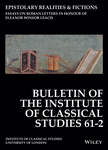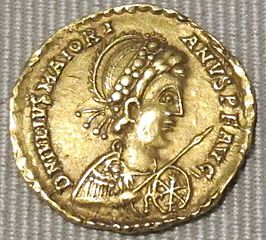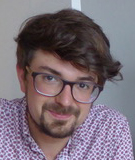
Month: December 2018


Mordax dens
Recently published: ‘Il mordax dens di Sidonio Apollinare nel panegirico per Maioriano’, Lexis 36 (2018) 305-15, by Tiziana Brolli.

Noël Duval Has Died
The distinguished French archaeologist Noël Duval has died. Born in 1929, he was a professor at Paris-Sorbonne University where he taught Late Antiquity and Byzantine Art. A defining personality in French archaeology for decades, he will be remembered, among much else, for his three-volume Les premiers monuments chrétiens de la France.
Obituary by the President of the Association pour l’Antiquité Tardive:
“Chers amis,
C’est avec beaucoup d’émotion et une très grande tristesse que je dois vous annoncer le décès de notre président d’honneur, Noël Duval, gravement malade depuis plusieurs années, survenu mercredi matin. Vous savez le rôle qu’il a joué dans la fondation de notre association et de la revue, deux entreprises qui lui tenaient profondément à coeur, la place éminente qu’il a tenue au sein de la communauté scientifique et son inlassable activité au service de l’archéologie de l’antiquité tardive, en Afrique du nord tout particulièrement. Même si nous ne le voyions plus parmi nous depuis longtemps, sa disparition nous touche profondément. Ses travaux stimuleront longtemps encore encore la réflexion scientifique. L’Association lui doit beaucoup et lui rendra hommage.
François Baratte
Président”

Dr Lütjohann, I presume?
From now on, “Lütjohann” is the spelling to stick to despite the hugely (but unduly) influential MGH spelling “Luetjohann”. “Lütjohann” was the way this scholar wrote his own name. Take a look at his signature in his collations from Florence, and take the opportunity to see him at work, on the Scholars page.

Hendrik Hess Doctorate
Hendrik Hess has taken his doctorate at the University of Bonn with a thesis about the self-concept of the Gallo-Roman elite. The book is to be published next year as “Das Selbstverständnis der gallo-römischen Oberschicht im historischen Diskursraum von Sidonius Apollinaris bis Gregor von Tours. Übergang, Hybridität, Latenz“ as one of the Ergänzungsbände zum Reallexikon der germanischen Altertumskunde.
Abstract
Die Studie fragt nach dem Selbstverständnis der gallo-römischen Oberschicht in der zweiten Hälfte des 5. bis zum Ende des 6. Jahrhunderts. In dieser Zeit der Neuordnung Galliens zwischen Imperium Romanum und der Bildung der Reiche der Visigoten, Burgunder und Franken gingen alte Gewissheiten verloren und neue entstanden, die Verfügungsmacht über materielle und immaterielle Ressourcen wechselte, Vorstellungen und Wahrnehmungsmuster änderten sich. Diese Dynamik spiegelt sich auch in der Veränderung des kulturellen, sozialen und politischen Wissens über die eigene gesellschaftliche Gruppe wieder. Die römische Oberschicht Galliens erscheint trotz der Umwälzungen jedoch keineswegs rückwärtsgewandt oder konservativ. Vielmehr zeigten sich schon die epistolographischen Übergangsrömer des 5. Jahrhunderts pragmatisch in Bezug auf ihr Selbstverständnis, das im Verlauf der Untersuchungszeit hybride Formen annahm und schließlich lediglich latent weiterexistierte.
